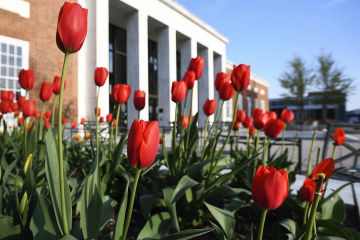Community partners who are working to address the causes of violence in Baltimore are encouraged to submit proposals to the new JHU Innovation Fund for Community Safety, which will invest $6 million over the next four years in grassroots interventions designed to make the city safer.
The university-funded initiative, launched by President Ronald J. Daniels in September as a key component of Johns Hopkins' commitment to reimagining public safety in our communities, will provide annual grants of up to $250,000 per project to grow existing organizations and provide start-up resources for new ideas. Along with financial support, the fund will offer technical assistance, data collection and analysis, and research through partnerships with experts across Johns Hopkins University. Proposals may be submitted now through 5 p.m., Thursday, Feb. 25, via the fund's website.
Those looking for a Johns Hopkins partner but not sure how to find one should plan to attend two virtual events this month: a Q&A on Tuesday, Jan. 19, and a "partner matching session" on Monday, Jan. 25. "Think of it as speed-dating to help match potential project partners," says Alicia Wilson, vice president for economic development at the Johns Hopkins University and Johns Hopkins Health System, and a co-leader of the initiative along with Bloomberg School of Public Health Dean Ellen J. MacKenzie and the Bloomberg School's Vice Dean for Public Health Practice and Community Engagement Josh Sharfstein.
"One of our university's greatest assets is its expertise and one of our community's greatest assets is its expertise," Wilson says. "The partner matching session is a unique opportunity for those two groups of experts to come together to think through how they might forge powerful partnerships to put forth community-based proposals of innovative approaches to community safety."
Community organizations, faculty, students, and staff may register for the Q&A session and the partner matching session by visiting the link for "Upcoming Events" on the Johns Hopkins Innovation Fund for Community Safety website.
The innovation fund augments the university's existing work in Baltimore—financial investments, technical assistance, and legislative advocacy—supporting education, job training and creation, and public safety efforts. It will also spark and strengthen partnerships between the university and the community with a shared goal of bolstering safety across the city.
The fund will support initiatives and projects led by community members and community organizations designed to reduce violence in the near term, as well as research in partnership with community organizations to inform these efforts. Initially, the fund will support efforts near the university's campuses in Mount Vernon, Charles Village, and East Baltimore, with the hope that successful endeavors can be replicated across the city by other community programs and/or institutions.
"Community-driven collaborations around public safety are a critical priority for Johns Hopkins, and the high level of community interest in the innovation grants is truly exciting to see," Daniels says. "I'm grateful for the work of Ellen MacKenzie, Josh Sharfstein, and Alicia Wilson to bring this to fruition and look forward to seeing the ideas from our Baltimore community in the weeks ahead."
The initiative's organizers say all ideas are welcome: No idea is too small or too complicated to be considered for funding and support, and although applicants can request up to $250,000 a year for up to four years of funding, it is perfectly acceptable to request less than the maximum amount. Awards will vary depending on the scope and promise of the activity proposed. Project teams are strongly encouraged to seek matching funds or in-kind support from public and/or private agencies when possible.
Potential topics include plans that would change norms and expectations about violence in the community; community mediation; support for individuals at high risk of committing or being a victim of violence, such as jobs programs, mental health services, and mental health support teams/partnerships; environmental changes, such as cleaning up or redesigning community common areas; collaboration with the public sector to advance policies that support effective, sustainable, community-engaged solutions for reducing community violence; or an analysis of violent incidents to inform community interventions to prevent violence.
Proposals will be evaluated by a panel of faculty, staff, administrators, community residents, and students with experience and/or expertise in violence prevention and a demonstrated interest in community-led and public health solutions for public safety.
For information, please visit jhu.edu/jhu-innovation-fund-for-community-safety to learn more or email innovationfund@jhu.edu.
Posted in Health, University News, Community
Tagged community, campus safety and security, innovation fund for community safety








